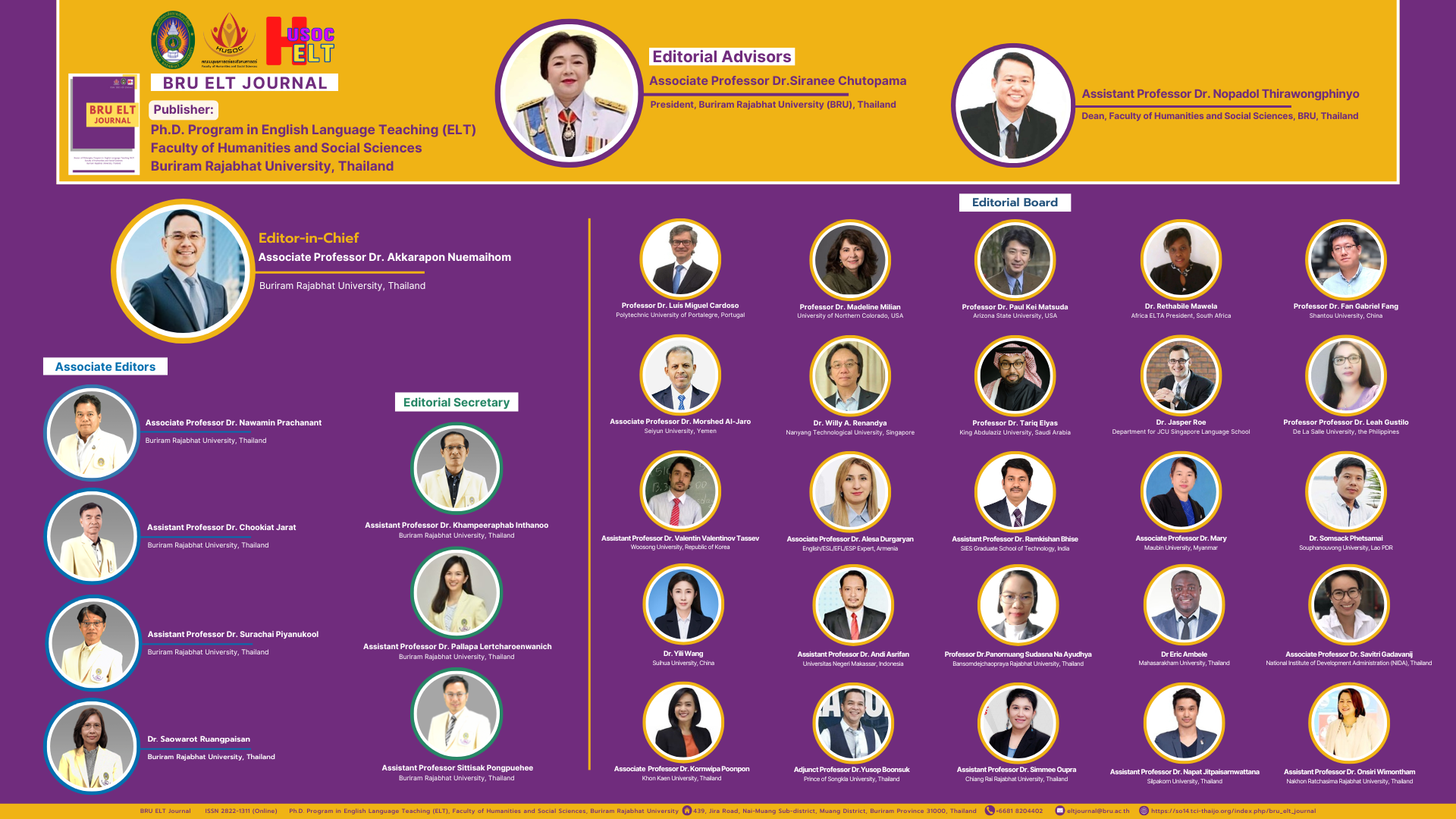A Qualitative Case Study of EFL Student Teachers' Teaching Practice during Practicum
DOI:
https://doi.org/10.14456/bej.2023.3Keywords:
pedagogical practices, practicum, reflection, supervisionAbstract
This study explores the teaching practice of English as Foreign Language (EFL) student teachers during a practicum course. It examines the student teachers’ pedagogical practices, received supervisory support, and their reflective practice experience when they were first placed at local public schools to practice teaching English. The qualitative research design using a multiple case study approach was adopted. The data were collected through documents, classroom observations and semi-structured interviews with four purposively selected EFL tertiary student teachers and their supervisors during their teaching practice in Yemen. A computer-aided qualitative data analysis software, Atlas ti, was used to organize and manage the analysis process. The findings reveal some pedagogical practice issues particularly in three areas: lesson planning, teaching strategies and classroom management. The results show that the student teachers’ insufficient pedagogical knowledge negatively influenced their pedagogical practices. Furthermore, the findings of study unveil a limited supervisory support and guidance received by the student teachers which consequently decreased their opportunities to interact with supervisors and get feedback on their teaching practices. Additionally, the findings indicated that the student teachers attempted to experience reflective practice through following some steps to increase self-awareness of their pedagogical practices and enhance their professional development. Thus, it can be concluded that the EFL professional teaching practice should entail the integration of three elements: pedagogical knowledge, supervisory support and reflective practice. Some practical and pedagogical implications for better teaching practice are drawn and directed to the EFL teacher education programme administrators and developers. The study also offers some suggestions which might benefit ESL/EFL researchers.
References
Albakri, I., Abdullah, M., & Jusoh, A. (2017). Lessons from experience: ESL student teachers’ reflection during practicum through reflective journals. Studies in English Language and Education, 4(2), 226 – 234.
Akbari, R. (2007). Reflections on reflection: A critical appraisal of reflective practices in L2 teacher education. System, 35(2), 192–207. http://doi.org/ 10.1016/j.system.2006.12.008
Al-issa, A., & Al-bulushi, A. (2010). Training English language student teachers to become reflective teachers. Australian Journal of Teacher Education, 35(4), 41–64.
Al-Khawaldeh, N. (2006). An investigation of the lesson Plans of tenth grade EFL teachers in Aman Directorate of Education. [Unpublished MA. Thesis], Faculty of Graduate Studies, University of Jordon, Jordon.
Al-Musalami, F. (2011). Evaluating the English language teacher professional preparation program in the Faculty of Education- Sana'a University in the light of quality assurance standards. [Unpublished doctoral dissertation]. Issuit University, Egypt.
Bataineh, R. F., Bataineh, R. F., & Thabet, S. S. (2011). Communicative Language Teaching in the Yemeni EFL Classroom: Embraced or Merely Lip-serviced? Journal of Language Teaching and Research, 2(4), 859–866. http://doi.org/ 10.4304/jltr.2.4.859-866
Braun, J. A., & Crumpler, T. P. (2004). The social memoir: an analysis of developing reflective ability in a pre-service methods course. Teaching and Teacher Education, 20(1), 59–75. https://doi.org/10.1016/j.tate.2003.09.006
Braun, V., & Clarke, V. (2006). Using thematic analysis in psychology. Qualitative Research in Psychology, 3(2), 77–101.
Canh, L. Van. (2014). Great expectations: The TESOL practicum as a professional learning experience. TESOL Journal, 5(2), 199–224. https://doi.org/ 10.1002/tesj.103
Chien, C. W. (2013). Teaching in a summer school program as practicum: challenges and implications. Journal of Language Teaching and Research, 4(5), 1011–1017. doi:10.4304/jltr.4.5.1011-1017
Choy, D., Lim, K. M., Chong, S., & Wong, A. F. L. (2012). A confirmatory factor analytic approach on perceptions of knowledge and skills in teaching (PKST). Psychological Reports, 110(2), 589–597. https://doi.org/10.2466/ 03.11.PR0.110.2.589-597
Choy, D., Wong, A., Lim, K. M., & Chong, S. (2013). Beginning teachers’ perceptions of their pedagogical knowledge and skills in teaching: A three year study. Australian Journal of Teacher Education, 38(5), 67–79. http://eric.ed.gov/?id=EJ1014053
Cochran, K. F., DeRuiter, J. A., & King, R. A. (1993). Pedagogical content knowledge: An integrative model for teacher preparation. Journal of Teacher Education, 44, 263–272.
Crasborn, F., Hennissen, P., Brouwer, N., Korthagen, F., & Bergen, T. (2008). Promoting versatility in mentor teachers’ use of supervisory skills. Teaching and Teacher Education, 24(3), 499–514. https://doi.org/10.1016/j.tate. 2007.05.001
Creswell, J. W. (2012). Educational Research: planning, conducting, and evaluating quantitative and qualitative research (4th ed.). Upper Saddle River, NJ: Pearson Education, Inc.
Creswell, J. W. (2005). Educational Research: planning, conducting, and evaluating quantitative and qualitative research (2nd ed.). Boston, NJ: Pearson Education, Inc
Darling-Hammond, L. (2000). How teacher education matters. Journal of Teacher Education, 51(3), 166–173. https://doi.org/10.1177/0022487100051003002
Endeley, M. N. (2014). Teaching practice in Cameroon : The effectiveness of the University of Buea model and implications for quality. Australian Journal of Teacher Education, 39(11), 147–160. http://doi.org/10.14221/ajte. 2014v39n11.9
Gay, G. (2010). Culturally responsive teaching: Theory, research, and practice. Teachers College Press. Goh, P. S., & Matthews, B. (2011). Listening to the concerns of student teachers In Malaysia during teaching practice. Australian Journal of Teacher Education, 36(3), 91–103.
Gravetter, F. J., & Forzano, L. A. B. (2018). Research methods for the behavioral sciences. Cengage Learning. Boston, USA.
Habibi, Akhmad; Mukminin; Safwan, Muhammad; Haswindy, Septu; Marzulina, L. (2018). Investigating EFL classroom management in Pesantren: A case study. the qualitative report, 23(9), 2105–2123.
Farrell, T. S. C. (2006). The first year of language teaching: Imposing order. System, 34(2), 211-221. http://dx.doi.org/10.1016/j.system.2005.12.001
Farrell, T. S. C. (2007). Failing the practicum: narrowing the gap reflective practice, TESOL Quarterly, 41(1), 193–201.
Farrell, T. S. C. (2008). `Here’s the book, go teach the class’: ELT practicum support. RELC Journal, 39(2), 226–241. http://doi.org/10.1177/0033688208092186
Feiman-Nemser, S. (2001). Helping novices to learn: Lessons from an exemplary support teacher. Journal ofTeacher Education 52(1), 17-30.
Flick, U. (Ed.). (2013). The SAGE handbook of qualitative data analysis. Sage Publications Ltd..
Friese, S. (2012). ATLAS.ti 7 user manual. Berlin, Germany: ATLAS.ti Scientific Software Development GmbH.
Killen, R. (2007). Teaching strategies for outcomes-based education. Cape Town: Juta.
Leavy, P. (Ed.). (2014). The Oxford handbook of qualitative research. Oxford University Press: USA.
Li, W., & Zou, W. (2017). A study of EFL teacher expertise in lesson planning. Teaching and Teacher Education, 66, 231–241. https://doi.org/10.1016/j.tate. 2017.04.009
Mackey, A., & Gass, S. M. (2015). Second language research: Methodology and design. Routledge.
Marshall, C., & Rossman, G. B. (2011). Designing qualitative research (5th ed.). Thousand Oaks, CA: Sage Publications, Inc.
Moody, J. (2009). Key elements in a positive practicum: Insights from Australian post-primary pre-service teachers. Irish Educational Studies, 28(2), 155–175. https://doi.org/10.1080/03323310902884219
Mudra, H. (2018). Pre-service EFL teachers’ experiences in teaching practicum in rural schools in Indonesia. Te Qualitative Report, 23(2), 319–344.
Mukeredzi, T. G., & Mandrona, A. R. (2013). The journey to becoming professionals: Student teachers’ experiences of teaching practice in a rural South African context. International Journal of Educational Research, 62(2013), 141–151. https://doi.org/10.1016/j.ijer.2013.07.010
Munby, H., Russell, T., & Martin, A. K. (2001). Teachers’ knowledge and how it develops. In V. Richardson (Ed.), Handbook of Research on Teaching (4th ed., pp. 877-904). Washington, D.C: American Educational
Murphy, J. (2003). Task‐based learning: The interaction between tasks and learners. ELT Journal, 57(October), 352–360. Retrieved from http://eltj.oxfordjournals. org/content/57/4/352.short
Quintero Corzo, J., & Ramírez Contreras, O. (2011). Understanding and facing discipline-related challenges in the English as a foreign language classroom at public schools. PROFILE Issue.
Richards, J. C., & Crookes, G. (1988). The practicum in TESOL. TESOL Quarterly, 21, 9–27. doi:10.2307/3587059
Richards, J. C. (2001). Curriculum development in language teaching. Ernst Klett Sprachen
Russell-Chapin, L. Sherman, N., & Ivey, A. (2016). Your supervised practicum and internship field resources for turning theory into action (2nd ed.). Routedge.
Saldaña, J. (2015). The coding manual for qualitative researchers. Sage.
Shulman, L. S. (1986). Those who understand knowledge growth in teaching. Educational Research, 15(2), 4–14.
Stake, R. E. (1995). The art of case study research. Thousand Oaks: Sage Publications.
Taole, M. (2012). Reflective experiences of post graduate certificate in education students during teaching practice. Research in Higher Education Journal, 1–11. Retrieved from http://www.jid.aabri.com/manuscripts/121243
Tuli, F. (2009). Understanding undergraduate students practicum experience: A qualitative case study of JIMMA University. Journal of Education and Science, 5(1), 37–61.
Wallace, M. (1991). Training foreign language teachers: A reflective approach. Cambridge University Press, Cambridge, United Kingdom.
Wong, Y. M., Mansor, R., & Samsudin, S. (2015). The challenge of producing progressive teachers in Malaysia: A case study of reflective writings among UPSI student teachers. Geografia Online Malaysian Journal of Society and Space, 11(7), 21-32.
Yaacob, A., Walters, L. M., Md-Ali, R., & Walters, T. N. (2014). Reflecting on Malaysian teacher trainees’ journals. Malaysian Journal of Learning and Instruction, 11, 1-21.
Yazdanmehr, E., & Akbari, R. (2015). An expert EFL teacher’s class management. Iranian Journal of Language Teaching Research, 3(July), 1–13.
Yang, S. H. (2009). Using blogs to enhance critical reflection and community of practice. Educational Technology and Society, 12(2), 11–21. https://doi.org/ 10.2307/jeductechsoci.12.2.11
Yin, R. K. (2009). Case study research, design and methods (4th ed.). United States of America: Sage Publications.
Zuheer K. M. M. (2008). The effect of using a programme based on cooperative learning strategy on developing some oral communication skills of students at English department, Faculty of Education, Sana'a University. [Unpublished doctoral dissertation]. Assiut University, Egypt.






